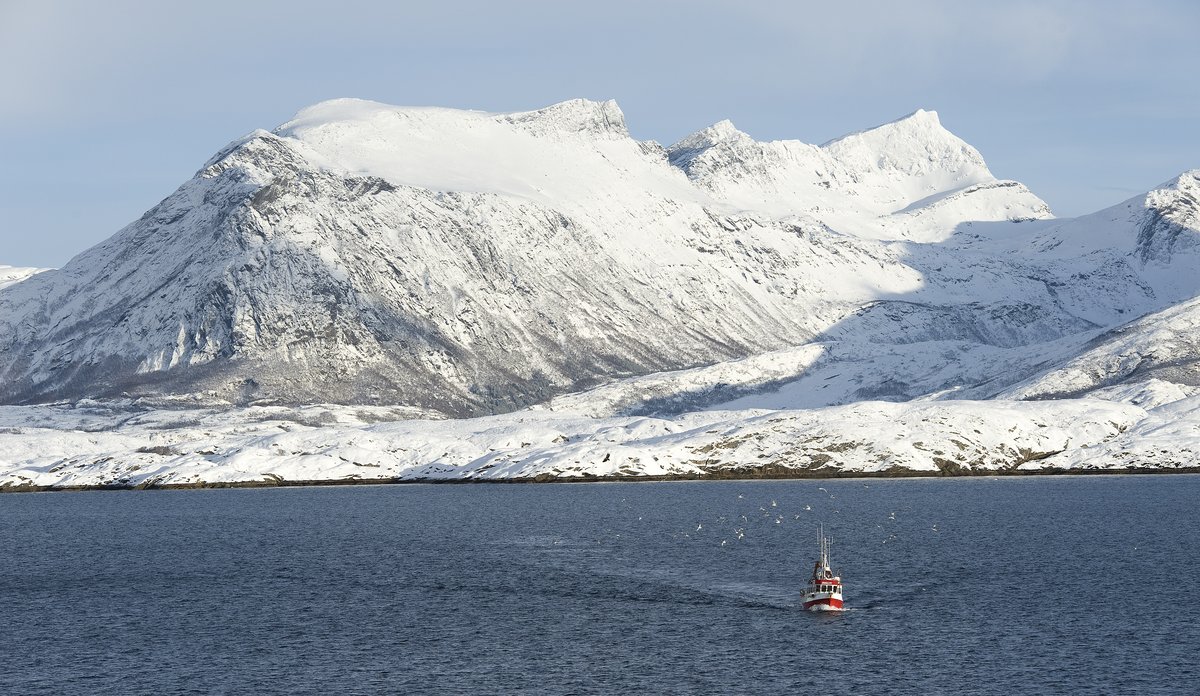Coastal Ecosystems

Small fishing boat. Photo: Jan Helge Fosså
Photo: Jan Helge FossåProgram Description
The long an extensive coastal zone of Norway has been an important and rich fishing area for generations of Norwegians up through the history, and there is still a viable coastal fishery within several geographic areas of mid- and northern part of Norway.
The coastal ecosystem is currently affected by an increasing number of impact factors due to human activities including the fishing industry, but also aquaculture industry, coastal engineering, pollution and climate change. Over-exploitation depletes species and reduces biodiversity, altering ecosystem structure and function. Climate change further exacerbates the stress on ecosystem dynamics and resilience.
The strong growth in the aquaculture salmon industry raises important fundamental questions regarding management of the coastal environment including sustainability, biological values, and nature types in the Norwegian coastal zone. IMR is currently running a national “coastal sea mapping programme” of fish resources and important habitats (spawning areas, nursery grounds).
The climatic conditions of Norwegian coastal waters are monitored on a regular basis by a set of hydrographical stations from Skagerrak to Finnmark. Observations show a significant sea temperature increase in the Atlantic Water along the Norwegian coast. Between 2000 and 2010 the mean temperature had increased about 0.7 °C above normal, which have a fundamental impact on the coastal ecosystems that must be understood and accounted for.
Long time series are essential to document, study and understand mechanisms causing changes in popular coastal resources, such as European lobster, coastal cod, saithe, halibut, wrasse among others. Some of these resources are overexploited. A 10-year study in four marine protected areas have documented a significant increasing effect on local lobster populations, however rebuilding of costal cod populations take longer time.
Impact
The impact of the scientific activity of IMR in coastal areas is based on basic research, and on several extensive monitoring programmes for a broad context of ecosystem elements. IMR have maintained many extraordinary time series over decades. The monitoring data is used as a scientific base both for generating relevant science, and for developing good advices to management within topics like marine resources, marine environment and management of marine habitats in the coastal zone.
The IMR contribute strongly to environmental monitoring, for example in relation to the Water Framework Directive and the Norwegian Management Plan for the Skagerrak and the North Sea. The Institute produce about 100 scientific papers on coastal research each year, covering a wide range of topics and several of them in high ranking journals. Most of our research has an applied focus and is of high societal relevance both for managers, the different industries and society.
Core Activities
Data/Monitoring
The Coastal Ecosystem Programme runs several coastal monitoring activities and scientific cruises aiming to cover regional and temporal basic ecosystem components connecting land and oceans. In terms of coastal resources, we aim at monitoring the whole ecosystem from algae, zooplankton, pelagic- and benthic fishes, lobster, crabs, seals and whales. We also have cruises studying more specific scientific challenges like effect of aquaculture, mining emissions, kelp harvesting, overexploiting, recreational fishery. Data collection is fundamental for our research and the ecosystem surveys are probably among the most extensive in the world regarding geographical area and ecosystem coverage.
Research
The multidisciplinary composition of scientists ensures a comprehensive approach in our research efforts to support management advice with knowledge of ecosystem structure, function and variability. We have been able to document vital changes in coastal fish communities due to climate warming and food web consequences using both empirical data and modelling. We have also documented dramatic decrease in several costal fish and shellfish populations, and shown that marine protected areas together with traditional management efforts may increase harvestable resources and key species.
Advice
Our research activities and monitoring programmes on coastal marine environment, resources and ecosystemes is an important contribution to a knowledge based management of the coastal zone of Norway. Regular dialogue seminars with management, scientific boards and industries are arranged to address common challenges, and developing new scientific assessment methods for commercial resources, and the environment.
Future Challenges
Increasing pressure from diverse human activities coupled with impact of climate change threaten the functional integrity of the coastal ecosystems. A multi-disciplinary approach towards understanding drivers, pressures and impacts in the coastal zone requires effective integration of data and information in policy and management. These coastal challenges provide an extraordinary opportunity to undertake fundamental, discovery-oriented, cutting-edge research that will immeasurably enhance our understanding of how individual organisms, species, and ecosystems respond to unprecedented directional and increasingly variable environmental change.
Published: 28.05.2021 Updated: 20.11.2025

